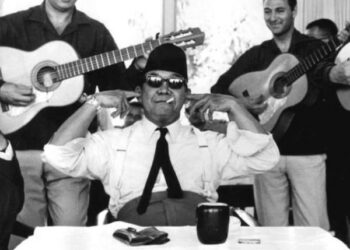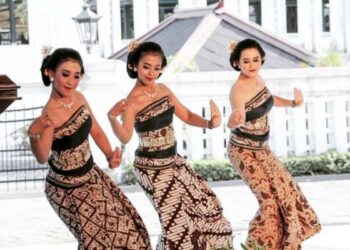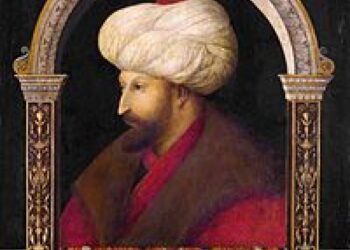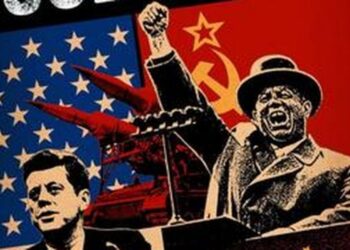CHAPTER I
Introduction
1. Writing Background
The national awakening was a time when the rise of the sense and spirit of unity, unity and nationalism and awareness to fight for the independence of the Republic of Indonesia. The rise of nationalism in Indonesia is inseparable from the rise of nationalism in Asia marked by Japan’s victory over Russia in 1905.
The causes of the rise of nationalism in Indonesia and the growth of the Indonesian national movement are not only influenced by influence from outside Indonesia. However, the reaction in the period before 1905 was triggered by the resistance of weapons in various regions, such as Pattimura resistance, Diponegoro, The Singamangaraja, and Hassanudin. This has proven that the spirit of nationalism has been turbulent in the Indonesian nation as a reaction to the suffering of birth and inner consequences of colonialism.
The unbearable suffering of the inner birth coupled with the influence of events inside and outside the country is an encouragement that accelerates the birth of the national movement and the point of departure of Budi Utomo on May 20 1908 as a student organization to advance low Priyayi interests, where the range of movement is limited to the people of Java and Madura. (M.C.Ricklefs : 1998 : 249)
2. Problem solving
Based on these reasons, there can be several problems that want to be solved, namely :
- What is the background of Budi Utomo’s organization in Indonesia?
- What are the purpose of Budi Utomo’s founding in Indonesia?
- How is Budi Utomo’s organization growing in Indonesia?
- How did the Dutch react to Budi Utomo’s birth in Indonesia?
- Why didn’t Budi Utomo jump straight into the political field like the organization he was born after?
- Why did Budi Utomo’s organization end?
3. Writing Purpose
In line with the findings of these problems, the main purpose of this paper is to :
- Knowing the background of the Budi Utomo organization in Indonesia.
- Knowing the purpose of Budi Utomo’s founding in Indonesia.
- Learn about the Dutch reaction to Budi Utomo’s birth in Indonesia.
- Aware of the development of the Budi Utomo organization in Indonesia.
- Knowing the cause of Budi Utomo’s absence in the Indonesian political field at the time.
- Knowing the cause of the end of Budi Utomo’s organization in Indonesia.
CHAPTER II
Resolving
1. The reason for the birth of the Budi Utomo organization in Indonesia
In the history of the national movement, the name Dr. Wahidin Sudiro Husodo has its place. Even though he was not one of the founders of Budi Utomo, his name was always associated with the national awakening organization because, in fact, he was the initiator of the organization founded by the STOVIA Jakarta students. (HM Nasruddin Anshoriy Ch dan dr. Djunaidi Tjakrawerdaya., Sp.Kj : 2008 : 1)
Dr. Wahidin Sudirohusodo himself is an STOVIA alumnus who often travels to major cities in Java Island to campaign for his ideas regarding financial assistance for outstanding indigenous students who are unable to continue their studies. He finally presented this idea to the STOVIA students in Jakarta, and it turned out that they welcomed the idea of the organization and from here the development started towards harmony for the Javanese and Madurese.
Budi Utomo is a student organization founded by Dr. Sutomo and students of STOVIA (School tot Opleiding voor Inlandsche Arsten) namely Goenawan, Dr. Cipto Mangoenkeosoemo and Soeraji, and R.T Ario Tirtokoesoemo, which was established in Jakarta on May 20, 1908. The organization is social, economic, and cultural and is not political.
2. The Purpose of the Establishment of the Budi Utomo Organization in Indonesia
Budi Utomo as this emerging student organization vaguely formulated its goal for the advancement of the Indies, where the reach of the original movement was limited to Java and Madura island which was later expanded to the Indian population entirely regardless of differences in ancestry, gender, and religion. However, in the development, there is a debate about the purpose of Budi Utomo, where Dr. Cipto Mangunkoesoemo who is politically and radical, Dr. Radjiman Wedyodiningrat who tends to pay less attention to worldliness, and Tirtokoesoemo (Regent Karanganyar) who pays more attention to the reaction of the colonial government than pay attention to the reaction of the indigenous people.
After a long debate, it was decided that the reach of Budi Utomo’s movement was limited to the people of Java and Madura and would not involve themselves in political activities. The field of activity he chooses is education and culture. Knowledge of Dutch was a top priority because without that language one could not expect a decent position in colonial staffing levels. Thus Budi Utomo tends to advance education for Priyayi people than for the indigenous population in general. Budi Utomo’s slogan changed from a struggle to make a livelihood into a suitable progression. This shows the influence of the moderate old class and the Priyayi who prefer his position. (Marwati Djoened Poesponegoro dan Nugroho Notosusanto : 1984 : 178)
3. Progress of Budi Utomo Organization in Indonesia
Budi Utomo’s presence in Indonesia was evidenced by his first congress in Yogyakarta on October 3-5, 1908. In a short period of time, Budi Utomo underwent a change of orientation. If the orientation is initially limited to Priyayi then according to the circular published in Bataviaasch Nieuwsbladtang on July 23, 1908, Budi Utomo Jakarta branch emphasized a new way of improving people’s lives.
In the congress produced several decisions, as follows :
- Do not hold political activities
- The main areas are education and culture
- Limited area of Java and Madura
- Appointed Raden Adipati Tirtokoesoemo (Regent of Karanganyar) as chairman of Budi Utomo.
Since being led by Raden Adipati Tirtokoesoemo, many new members of BU joined from the nobles and colonial officials, so many young members chose to get rid of it. Under the management of the older generation, Budi Utomo’s activities, initially centered in education, social, and culture, eventually began to shift in the field of politics. Bu’s strategy of struggle also changed from the initially very accentuating nature of proto nationalism to being more cooperative with the dutch colonial government.
The next development was the slowest period for Budi Utomo. His activities were limited to the publication of the monthly magazine Goeroe Desa and several petitions, which he made to the government in connection with efforts to improve the quality of junior high schools. As the leadership of the central management weakened, the Budi Utomo branches conducted their activities that did not result in much. The government that oversaw the development of Budi Utomo since it is n caught, attentively and hopefully finally concluded that Budi Utomo influence on the indigenous population is not so great.
In 1912 there was a change of leader from Tirtokoesoemo to the hands of Prince Noto Dirodjo who tried with all his energy to catch up. With the new chairman, Budi Utomo’s development is not so rapid anymore. The first results were the improvement of teaching in the sultanate and Kasunanan areas. Budi Utomo founded the Darmoworo organization. But the results are not so rapid. During his leadership, there were two other national organizations, Syarikat Islam and Indische Partij. Both parties are disgruntled elements of Budi Utomo.
Budi Utomo’s power has risen again since the outbreak of World War I in 1914. Successive discussions in local meetings shifted people’s attention from the question of conscription to the question of people’s representation, so that a mission to the Netherlands was sent by the Indie Weerbaar committee for India’s defense in 1916-1917 which was a sign of a very successful time for Budi Utomo.
Dwidjosewoyo as Budi Utomo’s representative in the mission successfully approached with the leading Dutch leaders the minister of colonial affairs information about the formation of the Volksraad (House of Commons) which was then discussed in the Dutch house of representatives, where he stressed that the body would be made the House of Representatives which would later be encouraging members of Budi Utomo’s mission. The conscription law failed otherwise the Volksraad formation law was passed in November 1914.
In the Volksraad council, Budi Utomo’s representatives remained cautious in launching criticism of the government’s political policies. Instead, the more radical indigenous members and dutch socialists in the Volksraad criticized the government by using the opportunity of the November 1918 crisis in the Dutch country they demanded changes to the Volksraad and dutch political policy generally until a commission was established in 1919.
4. Dutch Reaction to Budi Utomo Organization in Indonesia
Budi Utomo’s presence in Indonesia invited an unpalatable reaction from Dutch people who were unhappy with the presence of “the Molek“(can only dress up) and said that Javanese people were increasingly “cincong“(too much talk without action). (Prof.Dr.Suhartono : 2001 : 30)
M.C.Ricklefs said in his book Modern Indonesian History that governor-general van Heutsz welcomed Budi Utomo, as a sign of the political success of ethics that led to a progressive-moderate indigenous organization controlled by advancing officials. But other Dutch officials suspect Budi Utomo is considered a potential nuisance.
5. The Cause of The Loss of Budi Utomo Organization in Indonesian Politics
Why didn’t Budi Utomo jump straight into politics like the organization he was born with? Apparently, Budi Utomo went the way and adjusted to the situation and conditions at that time so it is natural that Budi Utomo is culturally oriented. This appropriate action meant Budi Utomo was responsive to the current colonial politics. An example is that the government has installed a Regeerings Reglement (RR) article 111 sign aimed at limiting the right to meetings and talks, in other words, restrictions on political rights.
As long as RR is still valid, Budi Utomo’s activities are limited to socio-cultural fields. This is proof that Budi Utomo always adjusts to the situation so that the cultural movement is more coloring of Budi Utomo’s activities in the early phases. Culture itself is upheld to respect self-dignity in order to be able to face foreign cultures that come in. (Prof.Dr. Suhartono : 2001 : 32)
6. Causes of the end of Budi Utomo Organization in Indonesia
In the third decade of the 20 century, socio-political conditions matured and Budi Utomo began to seek a steady political orientation and seek a wider mass. The political policy carried out by the colonial government, especially the pressure on the national movement, then Budi Utomo began to lose authority, resulting in the breakup of moderate and radical groups in Budi Utomo. In addition, because Budi Utomo never received mass support, his position was politically less important, so in 1935 the organization was officially disbanded. (M.C.Ricklefs : 1998 : 251)
Budi Utomo’s organizational objectives are not maximal because of many things, namely :
- There’s financial hardship.
- Raden Adipati Tirtokoesoemo’s attitude is more concerned with the interests of the colonial government than the people.
- Further advancing the education of the Priyayi than the commoners.
- The exit of members of the student group.
- Dutch is more of a top priority than Bahasa Indonesia.
- Priyayi is more concerned with the office than his nationalist spirit.
Chapter III
Final
1. Conclusion
Budi Utomo is a student organization founded by Dr. Sutomo and students of STOVIA (School tot Opleiding voor Inlandsche Arsten) namely Goenawan, Dr. Cipto Mangoenkeosoemo, and Soeraji seta R.T Ario Tirtokoesoemo. The establishment of Budi Utomo can not be separated from the role of Dr. Wahidin Sudirohusodo. The reach of Budi Utomo’s movement is limited to the people of Java and Madura and will not involve themselves in political activities. The field of activity he chooses is education and culture.
Budi Utomo’s presence in Indonesia invited a good reaction. Budi Utomo was considered a sign of political success by Ethics, a progressive-moderate indigenous organization controlled by advancing officials. But other Dutch officials suspect Budi Utomo is considered a potential nuisance. In his development Budi Utomo experienced fluctuations. Budi Utomo went the way and adjusted to the situation and conditions at that time so it is natural that Budi Utomo is culturally oriented. This appropriate action meant Budi Utomo was responsive to the current colonial politics.
In the third decade of the 20th-century socio-political conditions matured and Budi Utomo began to seek a steady political orientation and seek a wider mass. The political policy carried out by the colonial government, especially the pressure on the national movement, then Budi Utomo began to lose authority, resulting in the breakup of moderate and radical groups in Budi Utomo. In addition, because Budi Utomo never received mass support, his position was politically less important, so in 1935 the organization was officially disbanded.
Bibliography
- Suhartono. 2001. Sejarah pergerakan Nasional dari Budi Utomo sampai Proklamasi 1908 – 1945. Yogyakarta: Pustaka Pelajar.
- Ricklefs.1998. Sejarah Indonesia Modern. Yogyakarta: Gadjah Mada University Press.
- Poesponegoro, Marwati Djoened. 1984. Sejarah Nasional Indonesia V. Jakarta: Balai Pustaka.
- Anshoriy Nasrudin dan Djunaidi Tjakrawerdaya. 2008. Rekam Jejak Dokter Pejuang dan Pelopor Kebangkitan Nasional. Yogyakarta: PT LKiS Pelangi Aksara Yogyakarta.















